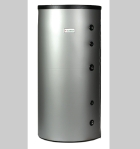Solar DHW eliminates the legionella risk

Lochinvar’s HSV thermal store, which generates commercial hot water from renewable energy and eliminates the risk of Legionnaires’ Disease, has been installed in accommodation for rig builders for Total Gas’s first onshore plant. Although the accommodation at Sella Ness on the Shetland Islands is temporary, it is built to high standards, and part of the complex will become part of a hotel after the workers have left.
The accommodation has been built to a high specification. There are six blocks, each housing 120 people and a seventh for amenities — including cafe, bar and fitness room. When the rig has been completed, most of the structure will be removed, but one block will remain for long-term use by tourists and other visitors to the islands.
Lochinvar was set the challenge by consulting engineers Wallace Whittle of designing a bespoke complete system for DHW within a restricted plantroom space and for a large number of people with high hot-water demands. The scheme consists of 12 EcoForce wall-hung condensing boilers, six 900 l buffer vessels and 12 HSV thermal stores linked to solar collectors.
The thermal stores supply pre-heated feed water to the Eco Force water heaters, reducing gas consumption. The design of HSV thermal stores eliminates the risk of legionella colonisation without the need for a complex pasteurisation regime.
Because weather conditions on the Shetland Islands are often tricky, the plantrooms and complete solar/direct LPG-fired water-heating were prefabricated off site.







